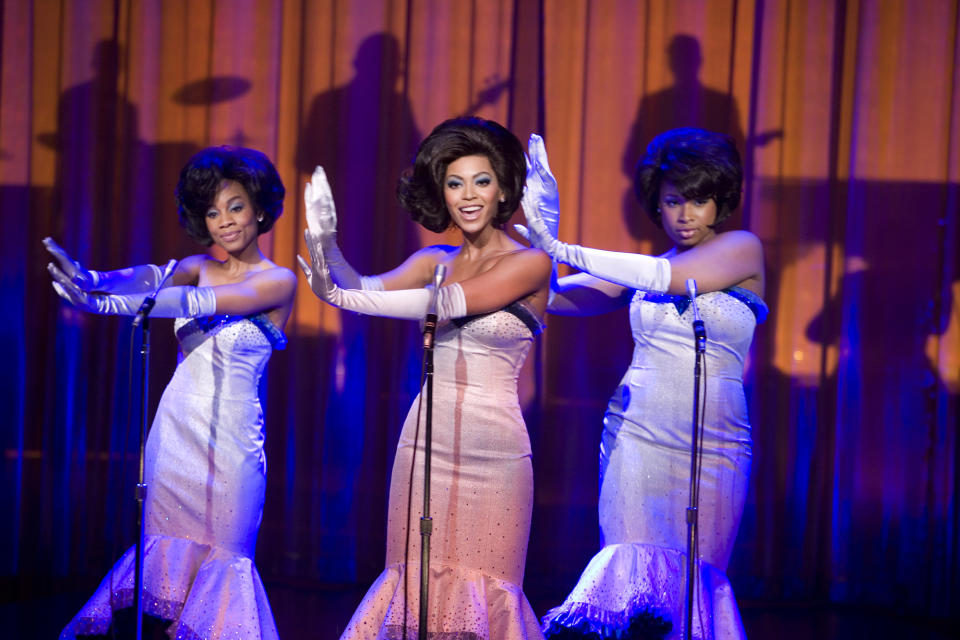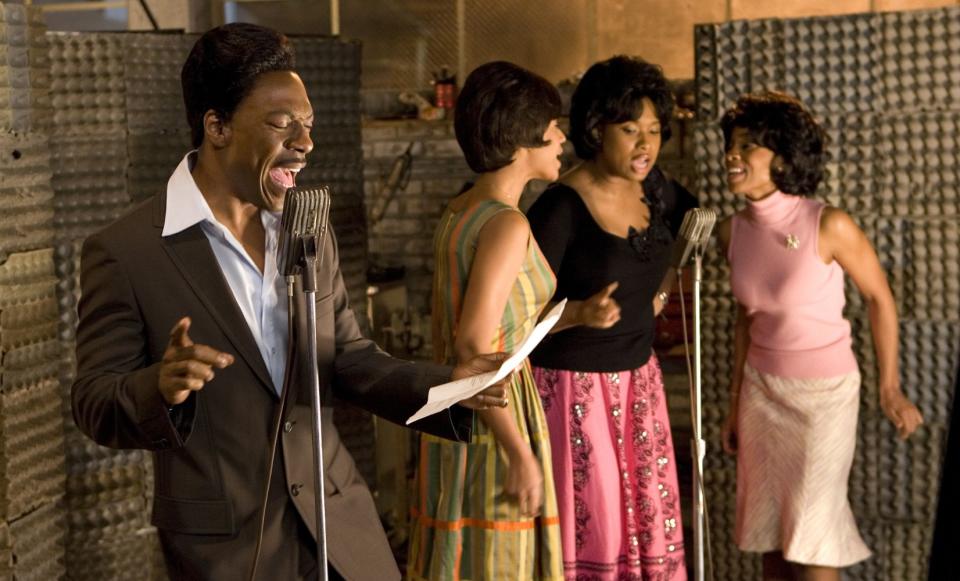Bill Condon reveals he wanted Beyoncé for 'Beauty and the Beast,' plus his inside secrets of 'Dreamgirls'

Beyoncé Knowles in Dreamgirls (Photo: DreamWorks/courtesy Everett Collection)
In 2006, director Bill Condon released Dreamgirls, a sparkling musical drama about fame, love, power, and Motown that brought the essence of Broadway to the big screen. More than a decade later, he’s still the only film director smart enough to put Beyoncé Knowles in a musical.
“Isn’t that weird? God, it seems crazy!” Condon tells Yahoo Entertainment, agreeing with our assessment that “see if Beyoncé is available” should be the No. 1 item on any musical director’s checklist. “I even tried to get her into Beauty and the Beast,” he reveals, “but it wasn’t a big enough part. She would have been a good feather duster.” (The role of the feather duster was played in Condon’s 2017 film by Gugu Mbatha-Raw.)
Knowles’s performance is among the many delights of Dreamgirls, a winner of two Academy Awards (including Jennifer Hudson for Best Supporting Actress) and a nominee for six more (including the only Oscar nod ever given to Eddie Murphy). Today, Dreamgirls becomes available for the first time in a “Director’s Cut Extended Edition” featuring never-before-seen footage alongside special features like the three leading ladies’ screen tests. In conjunction with the new home Paramount home video release (on Blu-Ray, DVD and Digital HD), Condon spoke with Yahoo Entertainment about the unique challenges of making the musical, the joy of watching Jennifer Hudson’s film debut, and his theory about why Dreamgirls was overlooked for a Best Picture nomination.
Based on the 1981 Broadway hit, Dreamgirls follows the rise, fall, and comeback of a fictional 1960s girl group called The Dreams (not-so-subtly based on Diana Ross and the Supremes). Played by Knowles, Broadway vet Anika Noni Rose, and first-time film actress Hudson, the trio gets their big break opening for Jimmy “Thunder” Early (Eddie Murphy), a James Brown-like soul singer. The Dreams achieve success, but not without a steep price for each singer. Effie (Hudson), the most talented performer of the group, is cast aside in favor of Deena (Knowles), whom the label thinks will be more appealing to white America. Deena becomes a star but must live under the thumb of the group’s exploitive manager Marty (Jamie Foxx). And Lorrell (Rose) has her heart broken by the self-destructive Early.

While Dreamgirls is a musical, it’s certainly not a comedy. A huge challenge for Condon was getting audiences to buy into the idea that realistic, dramatic characters can suddenly break into song. (Condon’s Oscar-nominated screenplay for Chicago had solved for this problem by staging the musical numbers as fantasy sequences, separate from the drama.) In contrast to the stage version of Dreamgirls, which opens with sung dialogue, Condon held off on having characters sing directly to each other for the first 45 minutes of the film. “We needed to bring people along who would otherwise resist that if it happened at first blush,” he explains.
His strategy was twofold: First, he set up the story with a series of musical numbers that took place largely onstage. Second, he made sure that the characters’ more personal songs — including Effie’s showstopper “And I Am Telling You I’m Not Going” — were set in theaters or recording studios, “so in a way, even though they’re not literally performing, they are in a performance mode.” It’s a sign of changing times that in the new director’s cut, Condon has chosen to use sung dialogue earlier in the film; he believes that in the past decade, audiences have become more comfortable watching screen musicals and don’t need to be eased into the idea quite so gradually.
Unlike the many film musicals that rely on quick cuts and big set pieces to keep the audience engaged, Dreamgirls takes a bolder and simpler tactic. Condon chose to shoot the characters’ key songs with long takes and close-ups, letting the performances shine through as they would on a stage. It was a decision that didn’t always make sense to studio executives. “I remember a junior executive saying with a straight face, ‘Do we really need all of ‘And I Am Telling You?’ Can’t we cut it down? We get it,’” Condon recalls with a laugh. “There was a little of that — not much though. The people who mattered, like [producer] David Geffen, understood.”
That unforgettable musical number, which occupies nearly five minutes of screentime, may be single-handedly responsible for netting Jennifer Hudson the Academy Award. It was the Dreamgirls scene that Condon shot last, and he remembers it well.
“By design, I put ‘I Am Telling You’ at the very end of the schedule, because Jennifer had not made a movie before, she hadn’t been on a movie set before, so [it was important] for her to have lived inside Effie for three months or so before she did that,” he explains. “Which I think was the right choice. But it was also like, we knew we had this huge mountain to climb, and it was weird to be exhausted at the end of the movie and then have the big challenging days.”
Condon says that “I Am Telling You” was shot over several nights, during which time Hudson “would stay very much to herself, and she was listening to music all the time to get in the right emotional state.” Hudson’s playlist, he later learned, was composed of music both sung by and inspired by her grandmother, “who had a great voice, who was in the choir, who never did anything professionally but could have” — a clear parallel to Effie. Every time Hudson sang the number, says the director, she threw herself into its emotional whirlwind.
“It was really extraordinary to watch,” he says. “I remember Jaime Foxx, the first time he watched her, he just went nuts. It was thrilling to be there.”
Though Dreamgirls racked up its share of awards-season honors, it failed to grab the industry’s biggest nomination: the Oscar nod for Best Picture. To date, it’s the largest-budget studio film with a cast of African-American leading actors. Given recent controversies over the Oscars’ treatment of diverse pictures, does Condon think racism played a factor in that omission?

“No. I don’t,” says the director. “Because I think if that were the case, then there’s no Eddie nomination and Jennifer nomination. I still stick to the answer I gave on that morning after: Why didn’t it get nominated? Because people liked five other movies more. I really believe it’s true! You can’t take anything for granted. And I don’t think there’s anybody who made any mistakes. It just so happens that that membership responded more to other movies. What can you say?”
Condon returned to movie musicals earlier this year with Disney’s live-action Beauty and the Beast. But when he envisions the future of the genre, he goes back, once again, to Beyoncé.
“You look at something like Lemonade: that is brilliant,” he says. “That is a brilliant new direction for movie musicals.”
Watch Jennifer Hudson’s Dreamgirls audition tape:
Read more from Yahoo Entertainment:

